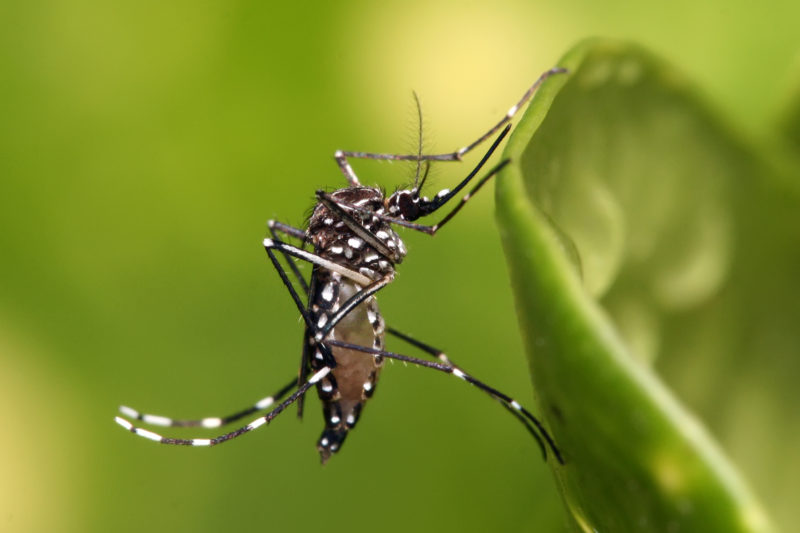Despite inherent concerns, genetically modified mosquitoes (GMMs) will be released in the USA for the first time in 2018. The Food and Drug Administration (FDA) recently approved a field trial (Phase 3) for a GMM strain of Ae. aegypti (Aedes aegypti) (OX513A) developed by Oxitec Limited to be released in Key Haven, Florida.

This disclosure was made in a recently published paper titled: “Transgenic Mosquitoes – Fact or Fiction?” and authored by André B.B. Wilke, John C. Beier, and Giovanni Benelli.
The Aedes aegypti, the yellow fever mosquito, is a mosquito that can spread dengue fever, chikungunya, Zika fever, Mayaro and yellow fever viruses, and other disease agents.
Technologies for controlling mosquito vectors based on genetic manipulation and the release of GMMs are reportedly gaining ground. But, according to the study, concrete epidemiological evidence of their effectiveness, sustainability, and impact on the environment and non-target species is lacking.
The writers contend that there is no reliable ecological evidence on the potential interactions among GMMs, target populations, and other mosquito species populations exists, adding that no GMM technology has yet been approved by the World Health Organisation (WHO) Vector Control Advisory Group. Strategies based on the release of GMMs are however currently being tested and evaluated by the Vector Control Advisory Group.
“Our opinion is that, although GMMs may be considered a promising control tool, more studies are needed to assess their true effectiveness, risks, and benefits. Overall, several lines of evidence must be provided before GMM-based control strategies can be used under the integrated vector management framework,” states the authors.
GMMs is said to be one of the emerging technologies for fighting mosquito-borne diseases (MBDs), which are among the most important infectious diseases that afflict humans, livestock, pets, and wildlife worldwide.
Taken together, dengue virus (DENV), Zika virus (ZIKV), yellow fever virus (YFV), chikungunya virus (CHKYV), West Nile virus (WNV), and malaria are responsible for endangering more than three billion people living in endemic areas, causing millions of deaths every year, countless long-term disabilities and sequelae, and costing billions of dollars annually in medical care and lost man-hours due to impairment of neurological and cognitive function.
Malaria and WNV are transmitted by several mosquito species with regional variation in their epidemiological importance, resulting in complex multispecies scenarios. Approximately 40 mosquito species of the genus Anopheles are capable of transmitting malaria to humans, and WNV has been detected in approximately 60 species from the genera Aedes and Culex.
Prospects for preventing (re)emerging MBDs indicate the difficulty in anticipating and controlling the spread of diseases. Between 2015 and 2016, ZIKV reached more than 60 countries, infecting more than 700,000 people. This epidemic highlighted the lack of tools available to effectively control mosquito populations and prevent the spread of vector-borne diseases. As a result, such diseases are a major issue for developed countries and are out of control in many developing countries that have undergone rapid unplanned urbanisation and lack the means to install proper mosquito surveillance and control strategies.
To date, MBD control has mostly relied on the use of insecticides to suppress mosquito populations. However, this strategy is losing effectiveness in several key species. Ae. aegypti is said to be rapidly developing resistance to common insecticides such as pyrethroids and organophosphates. A similar scenario can be found for Cx. quinquefasciatus, Anopheles funestus Giles, and An. gambiae. Moreover, the application of larvicides on potential breeding sites to control immature mosquitoes has also resulted in the development of resistance.
Considering the above scenario and the decrease in effectiveness of current mosquito-control strategies, as demonstrated by the recurrent outbreaks of MBDs, new technologies to control mosquito populations are being developed and tested in the field. One of such is the development of GMMs.
According to the study, the advent of functional and stable germ-line strains of GMMs has made available several new perspectives for controlling mosquito vector populations. Essentially, two strategies are available and they include:
- Population replacement – self-sustaining, involves the release of transgenic mosquitoes refractory to a given pathogen to replace the wild population, thus disrupting the cycle of transmission; and
- Population suppression – self-limiting, involves the release of mosquitoes carrying a lethal gene, impairing offspring production in a targeted mosquito population.
